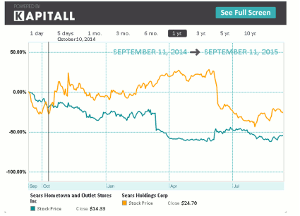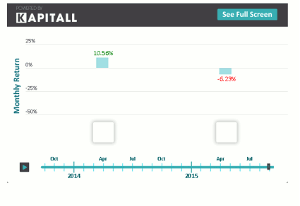Chris Lau, of Kapitall.com, illustrates why he thinks this retailer is a prime example of a firm that is struggling after failing to adapt to changing markets, citing its latest earnings report for support. Chris also highlights a different formerly struggling retailer, whose outlook, meanwhile, is improving.
Sears Hometown and Outlet Stores is having a hard time selling its wares. Just look at its latest earnings report.
Abrupt changes in consumer tastes or mistakes by management in relying on large-store formats in the face of changing consumer shopping habits can present significant challenges for retailers. Sears Hometown and Outlet Stores (SHOS) is one firm that is struggling after failing to adapt to changing markets. The company, which was spun-off from Sears (SHLD) back in 2012, is facing stiff competition from brick-and-mortar retailers as well as e-commerce firms and the stock is down 58% over the past year.
In 2014, nearly three-quarters of Sears Hometown and Outlet Stores’s revenue came from its Hometown stores. This is the unit that sells big ticket items like lawn and garden equipment and home appliances. Its outlet segment—which carries the same items as Sears Hometown in addition to home goods and exercise equipment, all at a discount—accounted for the rest of revenue.
Second-quarter results were dismal. In its earnings report released on September 4, Sears Hometown and Outlet revealed very weak sales. Overall same-store sales fell 1.4% year over year, with the hometown and outlet segments experiencing a 1.1% and 2.2% decline, respectively, while gross margin worsened by 20 basis points to 22.8%. The only thing that increased was adjusted EBITDA, up 103.4% to $5 million. Inventory fell around 8%, but it was still at an elevated $431.38 million.
There is a bright side to the results: cash flow was better, which allowed Sears Hometown and Outlet to cut borrowing from $30 million to $10.1 million. The company still has $234.3 million in borrowing room and it ended the quarter with $21 million in cash and cash equivalents.
Meanwhile, formerly struggling retailer J.C. Penney’s (JCP) outlook is improving. The company reported higher second-quarter revenue on August 14, with sales rising 2.9% to $2.88 billion in the second quarter.
1. J.C. Penney Company, Inc. (JCP): Operates department stores in the United States and Puerto Rico. Market cap at $2.91B, most recent closing price at $9.54.
2. Sears Hometown and Outlet Stores, Inc. (SHOS): Engages in the retail sale of home appliances, lawn and garden equipment, tools, and hardware in the United States. Market cap at $183.80M, most recent closing price at $7.99.
(Monthly return data sourced from Zacks Investment Research. All other data sourced from FINVIZ.)
By Chris Lau of Kapitall.com













